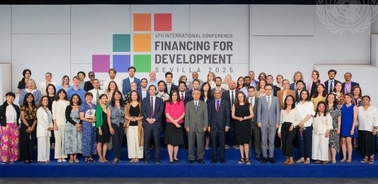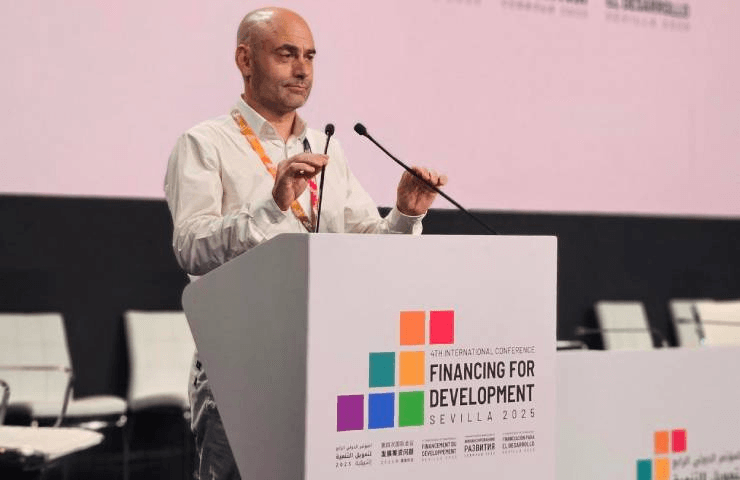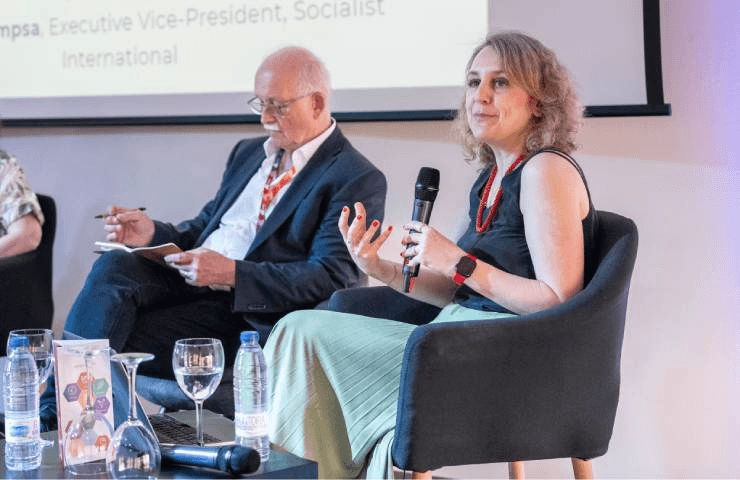IE University contributes to shaping the future of global development finance at the UN FFD4 Summit in Seville

IE School of Politics, Economics and Global Affairs and the IE Global Policy Center takes part in this summit to shape a fairer, more inclusive global financial architecture.
IE University has played an active role in the Fourth International Conference on Financing for Development (FFD4), held in Seville from June 30 to July 3 and convened by the United Nations. The summit brought together heads of state, UN leaders, economists, academics, and civil society to define the future of development finance in an era of accelerating global challenges.
Borja Santos, Vice Dean of IE School of Politics, Economics and Global Affairs, contributed to two key sessions. In the panel "Financing an Equitable, Fair, Inclusive and Resilient Future", he addressed the role of public policy and fiscal reform in building inclusive growth models. In the UN-hosted session "Youth Moving Beyond GDP: Intergenerational Equity to Finance What We Value", he called for mechanisms that reflect long-term societal needs and youth priorities in global financing frameworks.
"Global development finance stands at a critical juncture. With rising debt levels, shrinking fiscal space, and eroding trust in multilateral institutions, the gap between ambition and action has grown dangerously wide. We must go beyond symbolic declarations and deliver tangible progress."
Borja Santos, Vice Dean of IE School of Politics, Economics and Global Affairs
The Global Policy Center (GPC) also contributed to the conversation on reforming financial architecture and development cooperation. Director Ilke Toygür joined the high-level panel "Financing our Future: Crafting a Progressive Vision for the Future of Financing for Development," hosted by the Foundation for European Progressive Studies (FEPS). The discussion addressed the shifting priorities in the Global North—particularly the surge in security spending—and the implications for trust and cooperation with the Global South. As Toygür emphasized during the session, "The real dilemma isn’t choosing between development and security: it’s overcoming a global financial system that constrains countries’ ability to invest in both human and hard security".
On the margins of the conference, the GPC also launched the policy brief "Promises of Progress? Seville and the Future of Global Development Finance", authored by Borja Santos Porras. The brief outlines seven areas for reform, from debt resolution to climate finance, and urges global actors to move from rhetoric to results in an increasingly fragmented geopolitical landscape.
From IE University’s Center for the Governance of Change, Javier Capapé, Director of Sovereign Wealth Research, and Drew Johnson, Associate Director of the Sovereign Impact Initiative, attended multiple expert sessions on financial innovation, climate finance, and private capital mobilization. Their participation drew from the Center’s ongoing research on sovereign wealth funds and impact investing, including the recent 2025 Sovereign Impact Report.
The IE-iGDP Just Transition Observatory co-hosted the side event "Aligning Agendas: Creating Fiscal and Financial Pathways for Sustainable Development and Climate Action", bringing together leading voices from the Global South to explore transformative financing for equitable, climate-aligned development. Led by Cristina Fernández, Juan Acuña, Ana Belén Sánchez and Hu Min, the Observatory contributed the event with key insights on integrating climate resilience into fiscal and debt frameworks—emphasizing trust, inclusion, and long-term planning. This side event was created in close collaboration with the World Resources Institute, the Children Investment Fund Foundation, the Finance for Development Lab, the Gates Foundation, the Shanghai University of International Business and Economics’ International Development Cooperation Academy.
Paloma Durán, from the Provost Office, participated in the work of the International Business Forum, organized in parallel to the Conference, in preparation of the report with the International Chamber of Commerce on the new multilateralism, working with the private sector.
Finally, during the Conference, IE University had interviews and conversations with different leaders of International Organizations: UNDP, UN-Women, OECD and DAC Chair, UNCTAD, UNOPS, CAF, UNHABITAT, IGAD, and the International Committee of the Red Cross, among others.
IE University’s involvement in FFD4 reflects its commitment to bringing academic insight into real-world policy debates. Through its faculty, research centers, and ongoing collaboration with international institutions, the institution aims to contribute to the design of a fairer, more inclusive global financial architecture.

